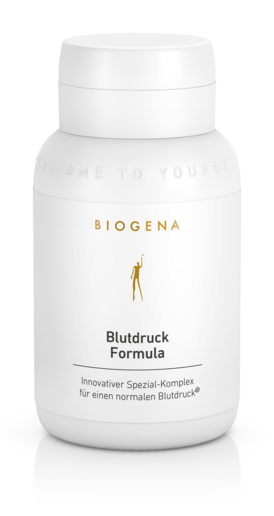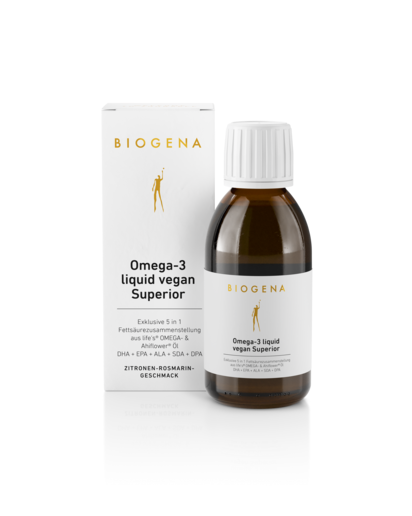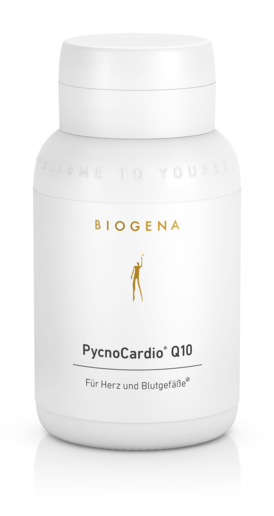Cardiovascular Health
Your heart is constantly busy, pumping blood through large, small, and downright tiny blood vessels to supply your cells with all the oxygen and vital nutrients they need. But the cardiovascular system is so much more than just a powerful pump with a sophisticated transport system.


Cardiovascular Health: What is good for the heart?
The cardiovascular system has enemies, but it’s not above accepting help
The “body’s engine", "source of life", and "most important muscle of the body" - the ways of describing the heart are as varied as they are true. But despite this, the “old ticker” often doesn’t receive the respect and appreciation it deserves. And the same goes for the whole circulatory system. Your blood vessels do an amazing job - in an ideal case, they should be super-stretchy and able to expand and contract, guaranteeing regular blood flow and keeping your body’s temperature as constant as possible. The heart and blood vessels have enemies that can make life difficult for them - but they also gladly accept any help that strengthens them. And what helps to strengthen the cardiovascular system, also strengthens your resistance to physical and psychological complaints.
Why is exercise good for the heart?
All roads to a healthy heart and vascular system start with one very important thing: EXERCISE. Like all muscles, the heart is designed to be challenged - otherwise, it gets lazy. Of course, there’s no need to start running marathons if that’s not your thing, but a few sweaty exercise sessions per week will work wonders.
Which diet and foods are good for the heart?
The next port of call should, of course, always be nutrition. Here too, there’s no need to go to extremes, either by starving yourself of all your favourite things or forcing yourself to eat things you don’t enjoy. Fruit and vegetables, whole foods and dairy products, fish, nuts and olive or linseed oil form a great framework, around which you can build your heart-healthy diet. Salt is the only thing that should be consciously avoided - try substituting it with fresh herbs, pepper or chilli for a full flavour that’s also heart-friendly.
Blueberries, apples, raspberries, spinach, cabbage & co:
It’s no secret: fruit and vegetables are healthy. We all know we should be aiming for 5 different portions every day. It doesn’t have to be complicated - one portion is equal to one or two handfuls (berries, chopped vegetables). They contain plenty of minerals and vitamins. Vitamin C for example, contributes to normal collagen formation for normal blood vessel function and helps protect cells from oxidative stress.
Linseed oil:
The oil extracted from flax seeds contains one of the highest concentrations of omega 3 compared to other vegetable oils, as the seeds contain about 40% fat. The unsaturated omega-3 fatty acid alpha-linolenic acid accounts for up to 56% of this. Eating at least 2g of alpha-linolenic acid (just one teaspoon of linseed oil) per day helps maintain normal blood cholesterol levels.
Nuts:
Fibre, unsaturated fatty acids, magnesium, vitamin E, and B vitamins… almonds, hazelnuts, walnuts, and the rest are jam-packed with nutrients. They’re perfect as a healthy snack between meals, especially as a substitute for salty snacks and sweets.
Lentils, peas, beans:
Plant-based foods make our hearts happy. There are countless delicious vegetarian recipes to try with pulses. Lentils, peas, and even peanuts are rich in vitamin B1 (thiamine), which contributes to the regular functioning of the nervous system and normal heart function.
Trout, char, carp, and catfish:
Local fish are a great source of omega-3. One or two servings of fish per week is recommended to make sure you’re getting enough of these valuable fatty acids - especially fatty species like salmon, mackerel, or herring. The omega-3 fatty acids EPA and DHA found in fish contribute to normal heart function. Tip: There are also alternative vegan sources of DHA.
Whole grains:
Whole grain products are not just a good source of fiber. Wholemeal flours from spelled, rye, or buckwheat also boast a high potassium content. Potassium is important for heart health as it helps maintain normal blood pressure. On top of this, whole grain products are also a good source of magnesium. Magnesium supports electrolyte balance and interacts with potassium in important metabolic processes. For example, a magnesium deficiency can lead to excessive potassium losses.
Grape seed and pine bark:
Admittedly, grape seeds and the bark of the French maritime pine are unlikely to find themselves as part of your regular diet. However, they are worth mentioning. Pine bark extract provides a high proportion of proanthocyanidins and grape seed extract offers valuable polyphenols. Pine bark extract can serve to protect the vascular walls and support blood circulation.
Eating heart-healthy means eating slowly
It’s not just what we eat that influences our well-being, it’s also HOW we eat. A balanced and varied diet certainly doesn’t have to mean going without your favorite foods. Embrace the variety and prioritise nutrient-rich plant-based foods. That way, you can feel free to indulge in the occasional treat - a bit of cake or chocolate now and then won’t hurt. It’s important to keep the joy and fun in eating, otherwise, all the well-intentioned advice in the world simply won’t stick. Another important tip to put into practice: take your time over meals and avoid distractions. We generally feel full after about 20 minutes. If you eat too quickly, you’re likely to overeat before your body has had time to realize that you’re full. Being distracted (by having the TV on, scrolling on your phone, or even reading) can work in the same way - you may not notice that feeling of fullness. So instead of rigorously cutting out all of your favorite things, it makes more sense to work on practicing mindfulness and becoming more aware of your body. A beautifully set table and a comfortable place to eat can have just as much of an effect on our well-being as the choice of food on our plates. Eating slowly will help you to feel calm and can even help you to taste your food better.
Vitamins and beneficial substances that are good for the heart and blood vessels
Over the years, science and intensive research have reliably shown which nutrients and vital substances the cardiovascular system needs to function at its best. Nutritional supplements can be used to help ensure an adequate supply. The following active substances and vitamins have a positive influence on the health of the heart and blood vessels.
Vitamin B1 (thiamine)
Vitamin B1 is sometimes also known as the "heart vitamin" or the "mood vitamin" - which just goes to show the wide range of functions this vital substance performs in the body. Thiamine is primarily needed to convert carbohydrates into energy, i.e. glucose, which in turn is needed in large quantities by the muscle cells, especially those in the heart, and the nerve cells. Vitamin B1 also plays an important role in the transmission of stimuli in the nervous system and the "communication" between nerves and muscles. It also influences the metabolism of the neurotransmitter serotonin, which is responsible for maintaining your good mood. Vitamin B1 can only be stored by the body in very small amounts (25 to 30mg).
Proanthocyanidins/OPC
Proanthocyanidins are secondary plant substances that (as macromolecules) are often also called oligomeric proanthocyanidins, OPC for short. OPC itself has potent antioxidant properties. Not only that, but it also enhances the effect of other antioxidants such as vitamin A, vitamin E or vitamin C. Free radicals damage the skin cells, while also attacking the elastin and collagen fibres in the blood vessel walls. OPC encloses these two proteins like a protective cloak and thus prevents disturbances of the sensitive balance in cell production. Essentially, OPC "impregnates" the blood vessel walls so that their elasticity cannot be damaged.
PycnoCardio® Q10 Gold is a well thought-out active ingredient concept with coenzyme Q10 (KANEKA Ubiquinol™) from the world market leader Kaneka, with proanthocyanidins from maritime pine bark extract (Pycnogenol®) and grape seed extract in combination with the two radical scavengers vitamins C and E and heart vitamin B1.
Cardiovascular health: your ticket to greater joy, empathy and happiness
It’s a well known fact that smoking damages the heart and blood vessels. But chronic stress also takes its toll on your cardiovascular team. So do your best to take it easy and banish those avoidable time pressures and unrealistic to-do lists from your daily routine. Keep calm and maintain a positive mindset.
The stress factor: rest, relax and recover
Advice and recommendations from doctors or therapists should naturally be taken to heart - in every sense of the word. But how can we stay calm while we are supposed to be integrating so many new rules and regimes into our lives? Well, you know what they say - a change can be as good as a rest. So it’s certainly worth trying our best to stay calm and look to the future with confidence.
The connection between stress and cardiovascular disease has long been known. You may well find that it’s the best place to start when considering a lifestyle change to improve your heart health.
Micronutrient supplements are a great way to get additional nutritional support. It’s also important to make sure you’re getting enough restful sleep - so you can enjoy the quality of life that helps a healthy heart and blood vessels thrive: An optimistic zest for life - the first step towards vitality, empathy, and happiness.
Prevention is always better than cure
So who should be taking precautions and following a few basic healthy-heart rules in their diet? And how do you create the best possible conditions for your cardiovascular system to work at its optimal level? The measures you can take to improve your heart health are as many and varied as people and their different lifestyles. Often, even small changes can make a big difference. For some people, regular exercise is the focus of a lifestyle change, for others, it’s cutting back on animal fats or alcohol.
One thing is for sure: everyone can benefit from a conscious diet, regular exercise, and stress reduction, even those without a family history of heart health problems. The main thing is to ask yourself a few questions: How can I best help my body stay healthy? What nutrients do I need? What is good for me and my heart? Which foods give me energy, which makes me dull and tired? How can I keep fit? What form of exercise do I enjoy the most? Which fruit do I like best? Which vegetables belong in my diet?
Further research
All of these questions can be answered. Many of the answers can be provided by a blood test and a medical consultation. For others, you simply need to listen to your body - and especially your heart.
BLOG
Would you like to know more about the heart and circulatory system? If so, you might find this article interesting:










